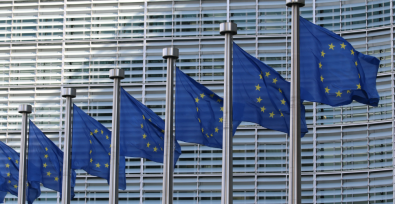A report published on December 6 commissioned by a group of E.U. lawmakers warns that “a substantial volume of apparel tainted by Uyghur forced labor is moving into the E.U. without restriction.” The report indicates how E.U. policy does not do enough to weed out forced labor from large supply chains and, therefore, does not protect consumers from buying products made with Uyghur forced labor, according to The Guardian.
Implication by state-sponsored labor transfers
Well-known brands have been identified as being at high risk of sourcing materials, specifically cotton, and PVC, made by Uyghurs coerced into forced labor through state-imposed labor transfers. According to the report,
“39 well-known brands are identified to be high risk of sourcing apparel made by Uyghurs compelled to participate in state-imposed forced labor transfers.”
State-sponsored labor transfer programs are lesser known than the Uyghur detention camps, where there have been widespread reports of human rights abuses. People are transferred to farms or factories in different locations where there is a need for workers, including people from Xinjiang, the Uyghur region, to other parts of China.
According to the report, several Chinese companies are involved in these programs, including companies that have public links with well-known brands like Zara, Next, and H&M. Meaning that many of the Western brands named in the report believe they source materials free of forced labor, however, they do not account for state-imposed forced labor.
“It is highly important to incorporate state-sponsored labour transfers and participation in other forms of repressive policies implemented in the Uyghur region as a red flag while evaluating companies based in mainland China,” said Yalkun Uluyol, one of the researchers.
Legislation that counts
The report addresses how legislation “can insulate markets from complicity in human rights violations against Uyghurs” by citing the success of the U.S.’s Uyghur Forced Labor Prevention Act in restricting imports from the region. This Act has resulted in over $500 million worth of goods being denied entry into the U.S. The report’s authors encourage the E.U. policymakers to follow this example and recommend further legislative actions to address:
- Support regulation to ban the imports of products made with forced labor, including products that are made only in part with forced labor, including cases of state-imposed forced labor, for businesses of all sizes.
- Support the E.U. Corporate Sustainability Due Diligence Directive to ensure that companies are responsible for addressing human rights violations across the value chain.
- Support transparency legislation that makes all ground, air, rail, and sea shipments publicly available to aid in investigating supply chains tainted with forced labor.
- Support multi-lateral information sharing of data regarding cargo that has been identified as having been made with forced labor.
Tell the EU to act now!
Freedom United echoes these recommendations and has just launched an action to call on the E.U. to address state-imposed forced labor directly and take a hard stance on all imports linked to forced labor. Take action now!







Freedom United is interested in hearing from our community and welcomes relevant, informed comments, advice, and insights that advance the conversation around our campaigns and advocacy. We value inclusivity and respect within our community. To be approved, your comments should be civil.
Sono totalmente d’accordo, perché i diritti umani devono sempre essere totalmente rispettati, ma mi augurerei che ciò accadesse in tutti i campi e per tutti i popoli